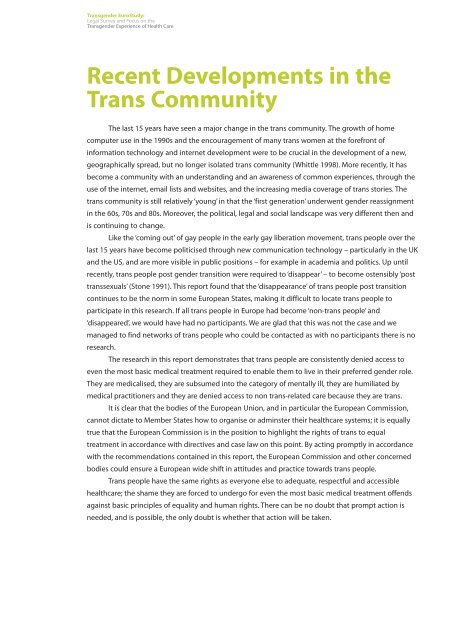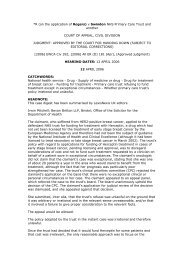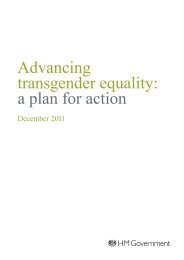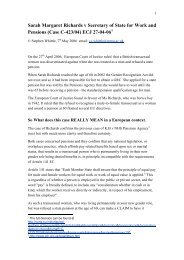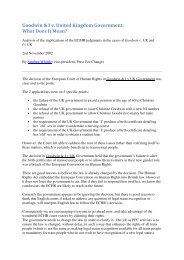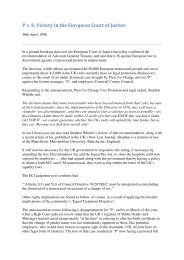Transgender EuroStudy â Legal Survey and Focus ... - ILGA Europe
Transgender EuroStudy â Legal Survey and Focus ... - ILGA Europe
Transgender EuroStudy â Legal Survey and Focus ... - ILGA Europe
Create successful ePaper yourself
Turn your PDF publications into a flip-book with our unique Google optimized e-Paper software.
<strong>Transgender</strong> <strong>EuroStudy</strong>:<br />
<strong>Legal</strong> <strong>Survey</strong> <strong>and</strong> <strong>Focus</strong> on the<br />
<strong>Transgender</strong> Experience of Health Care<br />
Recent Developments in the<br />
Trans Community<br />
The last 15 years have seen a major change in the trans community. The growth of home<br />
computer use in the 1990s <strong>and</strong> the encouragement of many trans women at the forefront of<br />
information technology <strong>and</strong> internet development were to be crucial in the development of a new,<br />
geographically spread, but no longer isolated trans community (Whittle 1998). More recently, it has<br />
become a community with an underst<strong>and</strong>ing <strong>and</strong> an awareness of common experiences, through the<br />
use of the internet, email lists <strong>and</strong> websites, <strong>and</strong> the increasing media coverage of trans stories. The<br />
trans community is still relatively ‘young’ in that the ‘first generation’ underwent gender reassignment<br />
in the 60s, 70s <strong>and</strong> 80s. Moreover, the political, legal <strong>and</strong> social l<strong>and</strong>scape was very different then <strong>and</strong><br />
is continuing to change.<br />
Like the ‘coming out’ of gay people in the early gay liberation movement, trans people over the<br />
last 15 years have become politicised through new communication technology – particularly in the UK<br />
<strong>and</strong> the US, <strong>and</strong> are more visible in public positions – for example in academia <strong>and</strong> politics. Up until<br />
recently, trans people post gender transition were required to ‘disappear’ – to become ostensibly ‘post<br />
transsexuals’ (Stone 1991). This report found that the ‘disappearance’ of trans people post transition<br />
continues to be the norm in some <strong>Europe</strong>an States, making it difficult to locate trans people to<br />
participate in this research. If all trans people in <strong>Europe</strong> had become ‘non-trans people’ <strong>and</strong><br />
‘disappeared’, we would have had no participants. We are glad that this was not the case <strong>and</strong> we<br />
managed to find networks of trans people who could be contacted as with no participants there is no<br />
research.<br />
The research in this report demonstrates that trans people are consistently denied access to<br />
even the most basic medical treatment required to enable them to live in their preferred gender role.<br />
They are medicalised, they are subsumed into the category of mentally ill, they are humiliated by<br />
medical practitioners <strong>and</strong> they are denied access to non trans-related care because they are trans.<br />
It is clear that the bodies of the <strong>Europe</strong>an Union, <strong>and</strong> in particular the <strong>Europe</strong>an Commission,<br />
cannot dictate to Member States how to organise or adminster their healthcare systems; it is equally<br />
true that the <strong>Europe</strong>an Commission is in the position to highlight the rights of trans to equal<br />
treatment in accordance with directives <strong>and</strong> case law on this point. By acting promptly in accordance<br />
with the recommendations contained in this report, the <strong>Europe</strong>an Commission <strong>and</strong> other concerned<br />
bodies could ensure a <strong>Europe</strong>an wide shift in attitudes <strong>and</strong> practice towards trans people.<br />
Trans people have the same rights as everyone else to adequate, respectful <strong>and</strong> accessible<br />
healthcare; the shame they are forced to undergo for even the most basic medical treatment offends<br />
against basic principles of equality <strong>and</strong> human rights. There can be no doubt that prompt action is<br />
needed, <strong>and</strong> is possible, the only doubt is whether that action will be taken.


